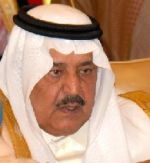Prince Nayef to Sign an Anti-Terror Defense Pact with Tehran
Neither the defense minister, Crown Prince Sultan, nor any of the usual retinue of senior security figures and aides were invited to Saudi King Abdullah’s conversation with the top US commander in Iraq, Gen. David Petraeus and Ambassador Ryan Crocker in Riyadh on April 15.
Straight after the royal audience, the two American officials met with interior minister Prince Nayef – again alone and without aides. Their meeting took place although, as DEBKA-Net-Weekly‘s US sources discloses, Washington knew that a trip to Tehran had been arranged to take place shortly for Prince Nayef or a Saudi delegation representing him to sign a mutual anti-terror defense pact.
The format of the two interviews raised two questions about the state of affairs in the Saudi royal house:
1. Has Prince Sultan’s health deteriorated so far that he was too ill to see the two Americans?
2. Did the second interview amount to informal, implicit American recognition that Prince Nayef has jumped over Crown Prince Sultan’s head to become the first in line to succeed Abdullah as king – which they have so far declined to do?
Washington has never been comfortable with the Saudi interior minister and his ties with radical clerics, some of whom maintain covert ties with al Qaeda elements. But the king surprised everyone this week by consenting to Nayef establishing a new army 35,000 strong, indicating that Abdullah too was reconciled to the prince’s unstoppable advance to the step before the throne.
Our military sources report that the new army, which is still in the early stages of recruitment and training, has been designated by royal decree guardian of strategic installations across the country including Saudi oil refineries. This alters a traditional balance of power in the kingdom, which assigned the monarch command of the National Guard and the Crown Prince command of the armed forces.
By permitting a new force to rise, the King rescinded the powers vested in him as National Guard commander to protect Saudi oil fields and installations.
Only 75, a spring chicken on the royal geriatric scale
 Intelligence circles in the Persian Gulf disclosed to DEBKA-Net-Weekly’s sources that another key task which has passed from the king to Prince Nayef’s new force is the protection of Saudi Arabia’s covert nuclear facilities, which are located at concealed sites in the military garrison town of Khamis Mushayt, south of Mecca.
Intelligence circles in the Persian Gulf disclosed to DEBKA-Net-Weekly’s sources that another key task which has passed from the king to Prince Nayef’s new force is the protection of Saudi Arabia’s covert nuclear facilities, which are located at concealed sites in the military garrison town of Khamis Mushayt, south of Mecca.
This subject is sensitive enough in Saudi Arabia to be unmentionable. Our sources stress that had Nayef not won Abdullah’s trust as the royal family strongman, he would not have delegated to him the care of a project so strategically vital to the kingdom’s security.
Petraeus and Crocker may have engaged him in the context of the key military and defense programs which have passed to his authority.
The would-be king, who is roughly 75 years of age – a mere spring chicken on the Saudi royal geriatric scale – has managed to push his way to the front of the race for the throne despite his unpopularity. A scion of the Sudairi branch of the royal family, he is disliked for his bad temper, cantankerousness, hidebound opinions and close ties with the most extremist clerical circles. He is a terror to work with.
For years, the anti-Sudairi factions in the royal house, headed by Abdullah, made every effort to impede Nayef’s progress to the top slot but one. But things are changing in Riyadh.
The interior minister is frenetically active in the public sphere and sounds off constantly on issues which are outside his ministry’s spheres of operation. Most uncharacteristically, Prince Nayef has begun scattering warm words of praise for King Abdullah in a manner which is unheard of in Riyadh but designed to improve his public image.
Many signs therefore combine to confirm that Prince Nayef has removed the obstacles on his path to the throne.


